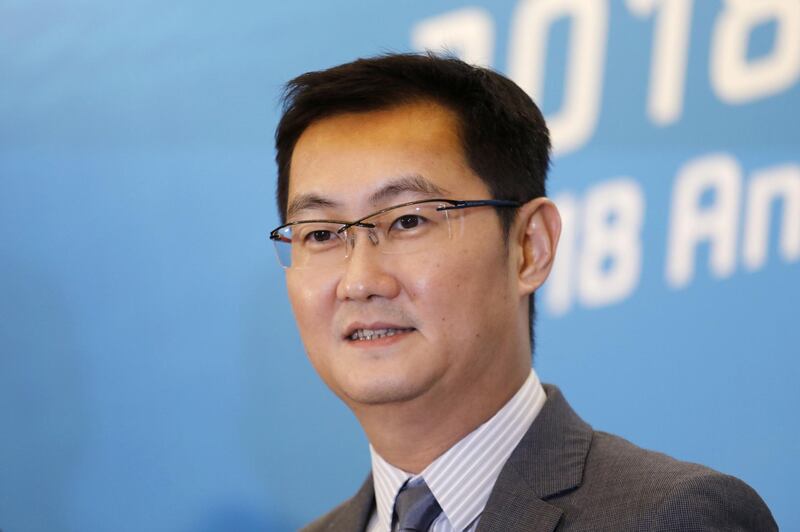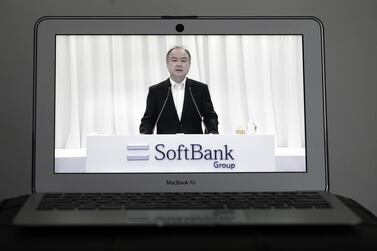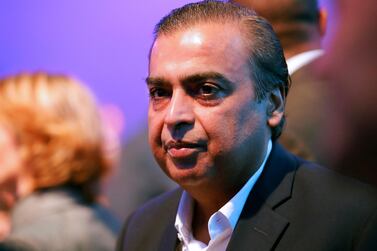Tencent’s $40 billion (Dh146.9bn) surge this past week has boosted the fortune of its founder and chief executive Pony Ma, helping him overtake Alibaba founder Jack Ma to become China’s richest person.
Mr Pony, 48, now has a net worth of $55.3bn while Mr Ma is worth $44.5bn, according to Forbes. The country's largest games developer surpassed Alibaba as Asia's most valuable company, with its shares rising above HK$500 (Dh237) for the first time in intraday trading last Wednesday.
The coronavirus pandemic has hastened the digitisation of the workplace and changed consumers' habits, boosting the shares of many internet companies. Now technology tycoons are dominating the ranks of China’s richest people.
Pinduoduo, a shopping app also known as PDD that is like Groupon, has more than doubled in value this year.
PDD founder Colin Huang, whose net worth stands at $43.8bn, pushed property mogul Hui Ka Yan of the China Evergrande Group into fourth position earlier this year, according to the Bloomberg Billionaires Index. Ding Lei of NetEase rounds off the top five.
Tencent has come a long way since hitting a low in 2018, when China froze the approval process for new games. Since then, the stock has almost doubled, and last month the company reported a 26 per cent jump in first-quarter revenue.
“Tencent’s online games segment will probably perform strongly through the Covid-19 pandemic, and most of its other businesses are relatively unscathed,” said Vey-Sern Ling, a Bloomberg Intelligence analyst.
That has been a boon for Mr Pony who owns a 7 per cent stake in the company and pocketed about $757 million from the sale of about 14.6 million Tencent shares this year.
Mr Pony studied computer science at Shenzhen University and was a software developer at a supplier of telecoms services and products before forming Tencent with four others in the late 1990s. At the time, the company focused on instant messaging services.
He overtook property tycoon Wang Jianlin as China’s second-richest person in 2013 and topped Baidu’s Robin Li as the wealthiest in early 2014. Later that year, Alibaba went public in the US, boosting Jack Ma’s fortune.
Tencent shares are up 31 per cent this year while Alibaba has advanced by just 6.9 per cent.
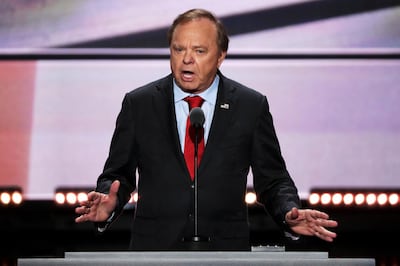
Harold Hamm
Harold Hamm bought more shares in the shale-drilling company he controls as oil prices recover from their historic plunge.
Mr Hamm, 74, added $57.1m of shares in Continental Resources, where he is executive chairman, according to a filing with the US Securities & Exchange Commission.
The 3.44 million shares he purchased bring his total of direct and indirect shares to 288 million, or about 79 per cent of the company.
He bought the shares at an average price of $16.62 beginning June 22. Continental fell 10 per cent last Wednesday to $15.12 but is still up more than double from when it bottomed out on March 9.
US oil futures fell to a low of minus $40.32 a barrel on April 20 but have since recovered to about $38.
Mr Hamm is a big name in the oil industry, having risen from the bottom of the business to become a self-made billionaire, mainly from being one of the first people to see the opportunity of horizontal drilling and hydraulic fracturing in the Bakken shale field in North Dakota and Montana.
He famously wrote his former wife a cheque for almost $1bn to settle their divorce in 2014 and stepped down as chief executive of the company in December.
He has remained one of shale’s biggest proponents during the market downturn that began more than five years ago.
However, his bullishness has not always been rewarded. In November 2014, Continental said it sold nearly all its hedges in a bet on rising prices just weeks before Opec increased production, driving crude prices into the $20s.
The Hamm family has a net worth of $5bn, according to Forbes.
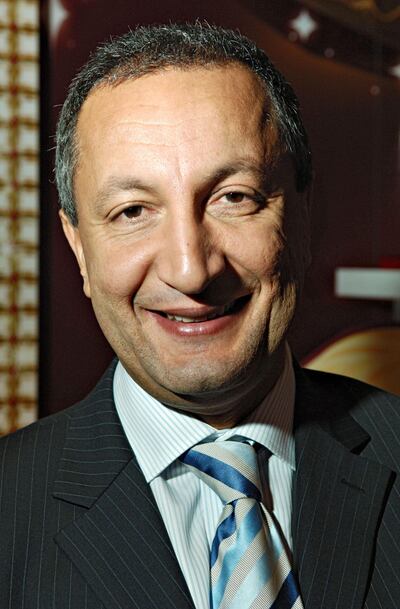
Isaac Larian
Isaac Larian, the billionaire chief executive of the company behind LOL Surprise! dolls, has deleted his Twitter account and a post on LinkedIn after calling freelance artist Amina Mucciolo a “disgrace to black people” and saying the Black Lives Matter organisation discriminates against Jewish people.
The LinkedIn post was deleted on Tuesday after a question from Bloomberg about a separate social media controversy. On June 18, Mr Larian called Ms Mucciolo a “#LIAR and #Extortionist” in a tweet. Ms Mucciolo had accused Mr Larian’s company, MGA Entertainment, of copying her likeness in one of its dolls.
Mr Larian later apologised and took down his Twitter account after he came under fire for his comments. He, however, maintained that Ms Mucciolo's claims were without merit.
“The words I used came from frustration because her actions are attacking the products and integrity of people I care deeply about. I was wrong for that,” Mr Larian said.
Mr Larian has long been known for his outbursts on social media. However, business leaders – and their comments about race – are under more scrutiny than ever.
A petition supporting Ms Mucciolo’s claims has drawn more than 13,000 signatures, and some customers on social media have threatened to boycott LOL Surprise! dolls, among the most popular toys in the US. MGA also makes Bratz dolls and Little Tikes toys.
At about the same time Mr Larian lashed out at Ms Mucciolo, he began a discussion on the Black Lives Matter movement and police brutality on LinkedIn.
“I fully agree with the #BLM movement (and NOT the BLM organisation which is anti-Semitic) and condemn police brutality. But #Defund the #Police? #Looting? Have we all gone mad? And 1000% the looting and destroying is a NO-NO. It absolutely increases racism EVEN-THOUGH a LOT of these looters were WHITE and Hispanics, they will blame Blacks,” he wrote last week.
Mr Larian has 30,000 connections on LinkedIn, and the post had 171 “likes” when it was taken down.
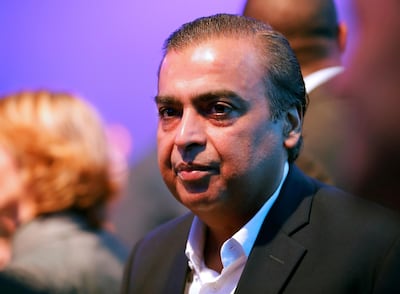
Mukesh Ambani
The net worth of Mukesh Ambani, chairman of Reliance Industries, has jumped to $64.5bn, making him the only Asian tycoon in the exclusive club of the world’s top 10 richest people, according to the Bloomberg Billionaires Index. He overtook Larry Ellison of Oracle and France’s Francoise Bettencourt Meyers, the wealthiest woman, to reach the No 9 spot.
Mr Ambani, 63, who owns 42 per cent of Reliance, has benefited from a flurry of investment into the company’s digital unit Jio Platforms that Reliance said has made it net debt free before a March 2021 target. The shares of the Indian conglomerate have doubled from a low in March, just as other billionaires on the list have been hit by the impact of the coronavirus pandemic.
While the Indian economy has been ravaged by lockdown measures to control the spread of Covid-19, “Mr Ambani’s companies [particularly the telecoms giant Jio] have prospered, and his personal wealth has increased substantially”, said Jayati Ghosh, chairwoman of the Centre for Economic Studies and Planning at the Jawaharlal Nehru University.
The rise in Mr Ambani's fortune as India heads for its worst recession is a reminder of the nation’s deep economic divide, in which the top 10 per cent hold more than three quarters of the total wealth, and where the majority of new fortunes created stay in the hands of the richest 1 per cent.
Mr Ambani lives in a 27-storey mansion in Mumbai that has three rooftop helipads, parking for 168 cars, a 50-seat movie theatre, a grand ballroom with crystal chandeliers, three floors of Babylon-inspired hanging gardens, a yoga studio, a health spa and a fitness centre.
While a crash in oil prices caused uncertainty in a stake sale of Reliance’s oil and chemicals division, Jio has managed in just two months to attract about $15bn – more than half the investment into telecoms companies worldwide this year.
Facebook, General Atlantic, Silver Lake Partners, KKR, Abu Dhabi Investment Authority, Mubadala Investment Company and Saudi Arabia’s sovereign wealth fund, the Public Investment Fund, are among those trying to get a slice of one of the world’s fastest-growing online commerce markets.
A June report by Sanford C Bernstein said Jio will probably capture 48 per cent of India’s mobile subscriber market share by 2025.
